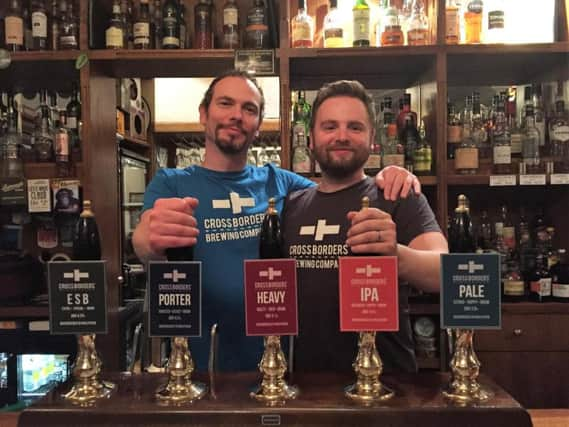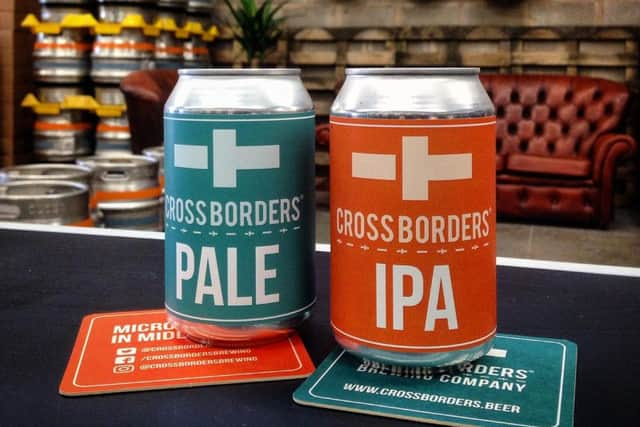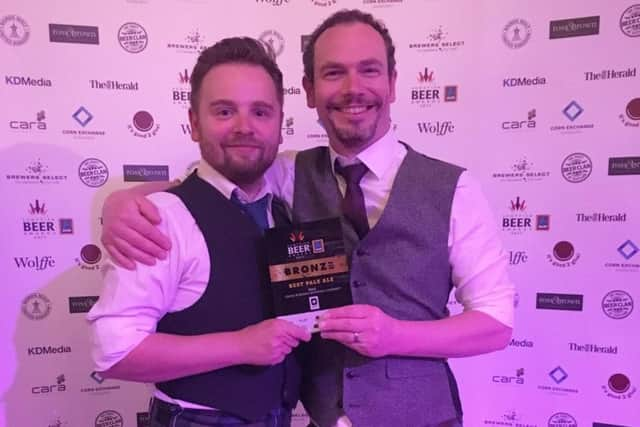Living the dream: how to run your own brewery


It only takes a few minutes talking to Gary Munckton, co-director of Cross Borders Brewery alongside Jonny Wilson, to understand precisely why both Santander and Close Brothers Asset Finance fell over themselves to finance his venture into the already crowded scene of craft brewery within Scotland.
“Isn’t it every Scottish man’s dream, to have his own beer on tap?”
Advertisement
Hide AdAdvertisement
Hide AdThat’s Gary’s response when asked why he wanted to start a craft brewery, and it characterises everything that comes after.


Every word from Gary’s mouth is charged with a passion for his company: from brewing what he purports to be spectacular ale (critics at the brutally frank ratebeer.com broadly agree), to the canning process, to branding, to strategy for growth. With Cross Borders Brewery launching in July 2016, and showing a 326% growth in beer produced a mere twelve months later, alongside a clutch of industry awards, he and best friend Jonny are a lesson in how to successfully launch a food or drink enterprise.
Ambition came early to Gary and Jonny, who have been best friends since the age of nine, and about a eight years ago had dreams of making it as rock stars.
“Unfortunately it turned out we were horrendous at music. We both realised we were never going to make any money from it, but we both wanted to do something creative,” recollected Gary.
Gary’s wife being from New York, he spent a fair amount of time in the States, where he noticed the craft brewery scene booming in a way it wasn’t yet in Scotland.


“The craft beer scene [here] was very much in its infancy, so I thought there was a great opportunity to do it right.
“I knew it was going to explode … it was going to be a noisy market place. So the liquid had to be of top quality.”
With the decision made to launch a craft brewery, both Gary and Jonny were determined to learn how to make the very best beer. Jonny studied for six years, first studying brewing at Heriot-Watt, before heading for work experience, learning tips of the trade from established brewers – Stewart’s Brewery, Alechemy and at a Yorkshire brewery.
Advertisement
Hide AdAdvertisement
Hide Ad“So he knew how to make great beer,” Gary enthused, “then I had to get the money.”


The process of getting the money involved writing a business plan in Gary’s beloved Kay’s Bar, on Jamaica Street Lane, all the while bending the ear of the owner to find out what made for a successful business venture. The first pitch, to Santander, for a start-up business loan, was approved in seven minutes. The second, for a more lucrative assets loan from UK challenger bank Close Brothers Asset Finance, took all of ten minutes for Gary to secure. The speed of this transaction he credits to his enthusiasm, and the comprehensive nature of his plan:
“You get quite far if you just get talking to people – if they see the whites of your eyes, the passion that you’ve got for the project,” he said.
Cross Borders Brewery secured its funding in February 2016. They were producing ale for sale by July the same year.
The pair settled on a unit for their brewery in Eskbank, realising that it was convenient – 15 minutes to Edinburgh, 45 to Glasgow – without charging inner city rents. They decided to opt for a larger space than most craft breweries would when starting-up.


“So many craft breweries get caught out when demand grows, and they can’t produce any more beer within the site. We opted for a bigger space than most start-ups do,” he explained, under the reasoning that if the business grew as they hoped they wouldn’t be caught short and forced to change location.
Talking to Gary about the establishment of his brewery, there’s a canny sense of the preservation of tradition. That manifests in things like their decision to use cans, not bottles - a decision with sound reasoning behind it, despite initially seeming foreign to ale drinkers.
“Technology has come a long way since then,” Gary said. “Now cans are lined with a water-based polymer that ensures no transfer of taste into the product.”
Advertisement
Hide AdAdvertisement
Hide AdPair that with the fact that cans block out all exposure to light, ensuring beer isn’t ‘skunked’, they’re lighter, easier to transport, faster to cool down and easier to recycle, so, in Gary’s words, “the real question is – why would you choose a bottle over a can?”
The name of Cross Borders comes from Gary and Jonny’s musical heritage: “It was the name of a song we wrote together. It was a horrendous song, but we always thought it was a great title, so we wanted to do something to give that title justice.
“When it came to branding, we didn’t want our cans to be noisy or with overly bright imagery, typical of many of the craft brands out there now have, with 75 colours and a cartoon on the can. That’s absolutely fine, but we decided we’d stand out more if we produced something that was a reaction to that. So our designs are block colour, with a big cross, and the ale is simply called Ale,” Gary said.
That carried through across their product line – a core collection, rather than focusing on experimental ales. Cross Borders produces five main brews:
“To me, it was crucial to build an identifiable brand. Spontaneity may work for a while, but it doesn’t always have longevity.”
They never entertained the idea of brewing lager, despite its dominant position in the beer industry, because “we don’t really enjoy drinking lager. It doesn’t excite us.” The desire to make money was never superior to the desire to do something they found fun and interesting.
So, what is the advice a successful SME has to potential food and drink vendors looking to launch their own companies? Gary is clear:
“For me, it is absolutely essential to make sure the primary producer has done their time at the tools, worked at the foot of the giants in their sector. Producing 1,600 litres of ale is completely different to producing 20 litres in your kitchen – no matter how great it is.”
Advertisement
Hide AdAdvertisement
Hide AdAmbition and Innovation: The future of food and drink in Scotland is being held on November 14, from 8.30am, at the Royal College of Surgeons, Edinburgh.
It will feature both industry leaders looking at how to grow the already booming Scottish Food and Drink sector into a £30 billion industry, and burgeoning businesses like Gary's doing new and innovative within their fields. For more information, or to book, click here